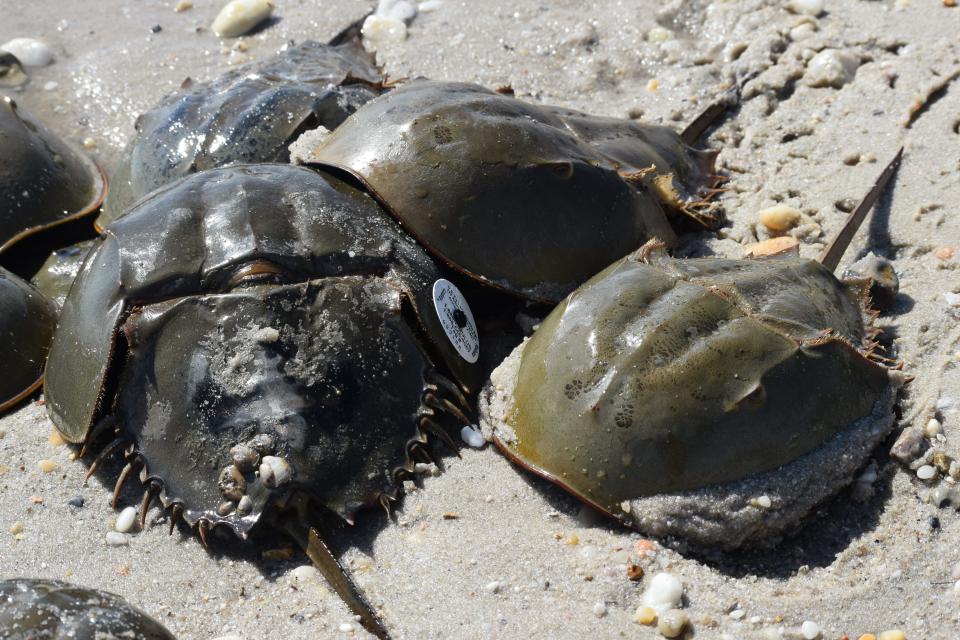'Shark Tank' to 'Jeopardy!': Small screen has a big impact on the coast
- Oops!Something went wrong.Please try again later.
Coastal Delaware is best known for its food, beaches, and shopping. We don’t think of the region as a focus of television programming. Nonetheless, that medium is in the very air we breathe with broadcasting, narrowcasting, but not, even with a DNREC permit and a cellphone, surfcasting.
Within the last few years, businesses and locations in the area have been featured on several popular TV shows.
For instance, the Frozen Farmer products of Evans Farms in Bridgeville were showcased in 2020 and 2021 episodes of "Shark Tank." As a result, their premium ice cream and other chilled confections are now sold at 8,000 outlets nationwide, including by local Giants (the stores, not the little league team) and Walmart.
The Frozen Farmer desserts are made from “imperfect” fruit that does not meet the aesthetic standards, if you can call them that, of chain grocery stores.

Such produce is not to be confused with genuinely Ugli fruit, which comes from the island of Jamaica, is readily available, and tastes considerably better than it looks.
Interestingly, the same food markets that refuse to stock imperfect fruit from Evans Farm are quite willing to sell Frozen Farmer products made from that same fruit.
If the most important thing in real estate is “location, location, location,” then it might be said that the key to food merchandising is “packaging, packaging, packaging”.
The coastal region has also been a presence on "Jeopardy!" In 2021, “Lewes” was a clue on that game show, and this year a former ferry boat deckhand from the First Town was a contestant. I am pleased to report that in the first instance the show’s host pronounced Lewes correctly, i.e., as “Loo-is.”
But I am saddened to relate that, in the second case, the deckhand wagered all his early round winnings ($8,400) on Final Jeopardy! and did lose, as in Lewes mispronounced as “Loo-ze.”
Recognition on these TV shows indicates that the region has put its toe in the water, so to speak, in terms of television programming.
Perhaps it’s time for one or more Delaware-themed shows. Not since NBC’s "The Pretender" in the late 1990s has there been a network show with an ongoing Delaware connection.
RELATED: See how the ferryboat deckhand from Lewes fared against Mattea Roach on 'Jeopardy!'
That action-drama series revolved around The Centre, a sinister think tank located in the fictional town of Blue Cove, Delaware. That’s one of the few geographic designations that hasn’t been applied to any local sub-division, although developers have certainly had their chances.
"The Pretender" protagonist was a skilled impostor, able to quickly master the complex skills necessary to impersonate a member of any profession. Find enough people like him and the labor shortage at local restaurants and shops becomes a thing of the past.

A possible contemporary venue for a coastal-centric show might be the History Channel. Lately, it has been defining “history” very broadly, possibly approaching historical fiction. That’s something you probably wish your Cape teachers had found acceptable when grading your social studies essays and exams.
For 212 episodes (and counting), the History Channel’s "Ancient Aliens" series has hypothesized that “historical texts, archaeology and legends contain evidence of past human-extraterrestrial contact,” dating back to pre-history; i.e., well before the Methodists held camp meetings at Rehoboth Beach.
Is it possible that they, the extraterrestrials not the Methodists, are still with us? In the immortal words of the series narrator: “Ancient Astronaut Theorists say ‘yes’”.
More:There's so many horseshoe crabs invading Maryland, Delaware shores right now. Here's why
Where, you ask, are these extraterrestrial aliens? They’re living in the ocean depths, something of interest (and possible intrigue) in any coastal region like ours.
And what marine arthropod has roots or, more correctly, legs dating back to pre-historic times? The innocent looking horseshoe crab, that’s who. With a family tree originating at least 350 million years ago, and enough leaf hints to crash the Ancestry.com website, the number, behavior, and appearance of those crabs are otherworldly.
In the Delaware Bay alone, by my count, there are 31.3 million horseshoe crabs.
With five sets of legs, they have enough limbs to function effectively even within the most complex UFO crab trap, err, cockpit, while their shells — functioning as inverted heat shields — keep them comfortable in the coldest of ocean water.
They brazenly engage in sex on the beach while participating in “the world’s oldest and largest wildlife migration,” a ritual that provides cover, in more ways than one, for their annual land-based reconnaissance.
Who would suspect that horseshoe crabs are aliens, given the caviar-like gifts that they leave for the red knots and other differently colored and untied migratory shore birds? And the fact that they are universally recognized as true “blue bloods” has led to their designation as a protected species.
So, be forewarned, the future of television programming in the coastal region may not be found in the air waves above, but rather in the sea waves below.
Mike Berger is a freelance writer and retired university administrator with a home in Lewes. Contact him at edadvice@comcast.net.
This article originally appeared on Salisbury Daily Times: TV on the coast: Small screen has a big impact

